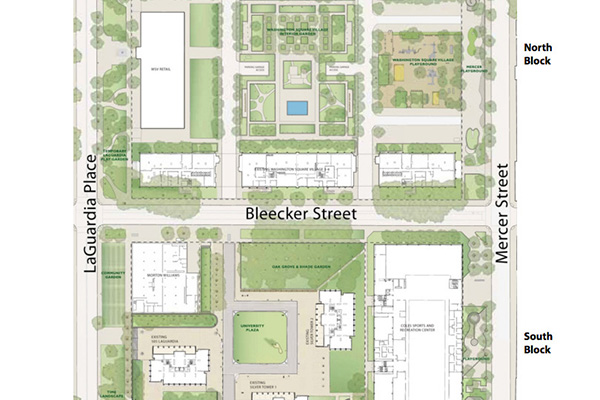
UPDATE Tuesday, Jan. 14, 4:30 p.m.:
In a university-wide email Friday, NYU General Counsel Bonnie Brier announced the university’s plan to appeal the ruling because of a disagreement over Mills’ assertion of “implied parkland.”
The strips of parkland in question were those between West Third Street and Bleecker Street along Mercer Street; the strip between West Third and Bleecker along La Guardia; and the La Guardia Community Garden site, said university spokesman John Beckman.
“That is why we are appealing,” Beckman said. “Because we think the court designating those three strips as ‘implied parkland’ was decided incorrectly; because the designation of those strips as parkland has practical implications that make it possibly more expensive and complex to build; and because there are public policy implications of the courts’ decision that could have negative effects on city-owned land throughout the five boroughs.”
The state legislature will vote on the issue if the appeal is denied.
–
Original story as follows:
Manhattan Supreme Court Justice Donna Mills ruled on Jan. 7 that the state legislature must approve the use of three strips of parkland within the area of the university’s planned expansion. The university cannot begin construction of its NYU 2031 plan in these disputed areas until the legislature votes.
Randy Mastro, the attorney representing Greenwich Village residents, explained that the city illegally allowed NYU to take parkland, as the ruling is not the city’s decision.
“State law requires prior approval from the State Legislature in order to alienate public parkland, which was not obtained in this case,” Mastro said. “The judge found in our favor on that basis and therefore enjoined the project from going forward unless the state legislature approves.”
Mastro said Deborah Glick, the State Assembly member for the 66th district, which includes Lower Manhattan, is a plaintiff in the lawsuit and does not plan to approve NYU’s ownership of the parkland.
A fourth strip of land was not considered parkland by the ruling. NYU spokesman John Beckman said the project for that portion of land — a new building replacing the Coles Sports Center on Mercer Street that will be known as the Zipper Building — can continue as planned.
“This is a complex ruling, but the judgment is a very positive one for NYU,” Beckman said.
Beckman also said the judge dismissed five other claims from the petitioners and that she reaffirmed the expansion project.
Mastro said NYU must start from square one in order to continue with the expansion plan.
“It is fanciful for anyone to spin that parts of this comprehensive project, which was approved as a whole and reviewed for environmental impacts on that basis, could still now somehow go forward without starting from scratch,” Mastro said.
Beckman denied the opposition’s claim that the plan proposals must be re-evaluated.
“The court did not vacate the City Council’s [Uniform Land Use Review Procedure] approval and specifically rejected petitioners’ claim that the street adjoining the gym site is a park,” Beckman said.
History professor Rebecca Karl said NYU’s plan to continue is shameful.
“A private University in the ‘public trust’ should take public park space far more seriously and should not attempt to use legal process to undermine the substance of public access to public space,” Karl said.
Ann Schmidt is news editor. Email her at [email protected]





















































































































































